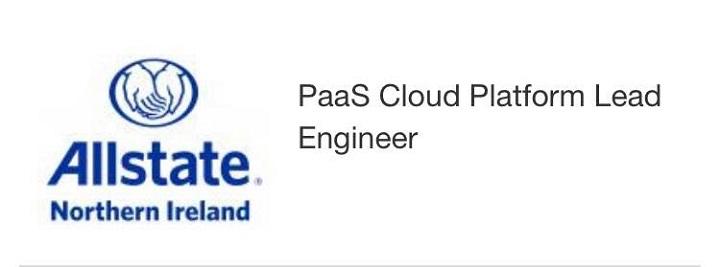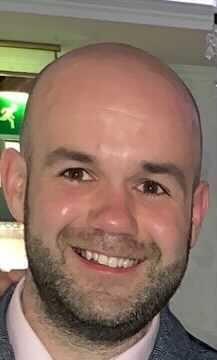
Allstate Northern Ireland is currently hiring for a PaaS Cloud Platform Lead Engineer, with applications closing this Friday 27 November.
To help prospective applicants understand more about the role and what it entails, Sync NI spoke with Kieran Robinson, a PaaS/CaaS Cloud Platform Senior Engineer.
Kieran has worked at Allstate NI for eight years, joining the firm after graduating with a degree in Information Technologies at Ulster University.
RELATED: Check out all of Allstate NI's current job offerings on our Jobs page
So Kieran, what does a typical day in your role look like?
We have an AI team here in Belfast with the other half of our team is in various locations in the USA. In the morning I’ll pair with someone locally on various tasks or in the afternoon I’ll cross pair with someone in the States.
We work on either PaaS or CaaS at the minute, with PaaS being like the PCF (Pivotal Cloud Foundry) platform where the vast majority of our container applications are hosted. CaaS is what we’re moving towards, which is basically Kubernetes.
The past year I’ve been mainly focusing on Kubernetes tasks, which would involve architecting and building out our various Kubernetes platforms both in a cloud and on-premise.
It varies quite dramatically what we could be working with.

We’ve worked a lot with Terraform, Amazon Web Services and did a lot of research on EKS and automation. Everything we do has to be automated, so we used either Jenkins pipelines or Concourse CI, and a lot of bash scripting and Terraform etc to basically automate the whole process of delivering a Kubernetes cluster.
In the background, once we have that offering it’s important people use the platform, so we then work with the business to see how can we as best as possible get product teams to start using this platform that we’ve built out, to make it beneficial.
We have a lot of automation and technology stacks to build on top of that. We make use of our chosen ingress controller to really scale and make running 1000’s of containers on the platform cost effective. We use OPA (Open Policy Agent), which we build a rule set around in terms of do’s and don’ts; what product teams can access on the platform and what they can’t. We use a GitOps approach for all of our clusters, this is with the use of flux.
It sounds like no two days are the same for you then, as there’s lots of different stuff to be working on!
100% definitely! On a Monday for example our product manager will give us a list of tasks that he or she thinks – based on their conversation with the business – are most critical this week for us to deliver. We’ll have our retros on a Friday – what went well or what went bad. Literally every week could be different based on that.
RELATED: Allstate NI receives award for its commitment to diversity and inclusion
How did you get into the role you’re in now?
From graduating I joined Allstate. Back in 2014 or so, I started looking at AWS, Docker, Cloud Foundry etc. I did self learning on these cloud technologies in my own time, then I saw the role come up for a Platform Engineer nearly five years ago.
I applied for that because that was the sort of work they were doing. I got that role, and from that it’s just been continuously – a culture and a mindset – the technology stack is pretty awesome, it’s been about continuously learning on the job and learning about Pivotal Cloud Foundry and definitely over the last few years a move to Kubernetes.
Is there any advice you would give to anyone looking to apply for the new PaaS role, for example, what skills or qualities they should have?
For anyone who wants to know about Kubernetes, it very much uses Docker because it’s the underlying container platform that Kubernetes orchestrates. For anyone applying for the new role, a good level of Docker I’d say would be required, and Kubernetes itself, because the amount of different components and architectural decisions you could make based on Kubernetes – there’s a lot of different options out there.
Networking is also obviously highly important, to a product team their app will just simply run on the platform and they don’t necessarily know where its running and that’s fine. However if they ever run into issues or need assistance in understanding the architecture of the platform that’s where we can provide assistance.

I suppose from a container perspective as well, networking is critical we had a range of different CNI options to evaluate which fits best from an architecture perspective for our Kubernetes clusters.
There’s so many different services with AWS but it would be a big one too. Things like building out different VPC’s, security groups and EC2s etc.
A good knowledge of Terraform because obviously you can’t go into AWS UI and start clicking buttons to create this one cluster. In a very small company it might work where you only need one or two services built out, but when you’re trying to do it at scale automation is key, so quite a good background in using Terraform I would recommend, because once it’s automated you can really rinse and repeat.
We mainly use bash scripting and there are some of the team who would use some GO programming elements. A bit of Python as well.
RELATED: Allstate NI: The future of the customer experience
I’ve mentioned the cloud a lot but we also have an on-premise offering, so a bit of background in VMware would be beneficial as well.
I know I’ve mentioned quite a lot of topics there but that is where the culture and mindset comes in, in that it is quite a lot of stuff and sometimes when even different product teams in Allstate see the amount of technologies that we use, they think how do we learn all that?
I suppose it’s all about adopting change and not being afraid of it. They are all learning opportunities and the pairing element is good as well because if I miss something, my pair will pick it up the error and we can fix and more forward.
It’s 100% true that we learn it as we go! We could spend two or three days doing R&D activities for a product, then once we get a feel for how it works we can look at incorporating it into our infrastructure and operationalise it, to deliver a working solution. It’s being able to not be phased by something. It’s a case of not always knowing what something is but wanting to figure it out.
Our team has a lot of independence and free reign to experiment and try and deliver solutions which is good for learning on the go because you’re not tied down to certain products.

Kieran has worked at Allstate NI for eight years
RELATED: Allstate NI: Stay cyber savvy with these top tips
Find out more about Allstate NI’s current PaaS Cloud Platform Lead Engineer and apply for the role here.